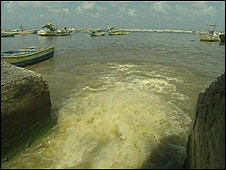For over a year, Israel has allowed little more than basic humanitarian aid into Gaza, as a means of isolating Hamas.
A ceasefire between Israel and Hamas two months ago was meant to lead to the easing of restrictions, but progress has been slow, and frustration is rising.
In the dank basement of one of Gaza's sewage pumping stations, raw sewage sprays out of leaks in the rusting metal work.
The Strip's sewage system is one of many things affecting Gazans' quality of life that urgently needs updating.
"It took months and months of negotiations to get Israel to allow some spare parts through the borders," says Maher al-Najjar, an engineer at the Gaza Emergency Water Project.
Gaza fisherman
"What we really need is for things to be modernized. We have funding and planning, but Israel won't allow the machinery in."
As it is, most of Gaza's sewage cannot be treated properly, so tons of raw waste flow straight into the sea.
"It's affecting our port, it's affecting the fishermen, it's affecting the fish we eat and the people swimming in the sea," says Najjar.
"The sewage has no border and has spread right along our coastline."
Economy paralyzed
Less than 20 meters away from a sewage outlet, we find Abdullah, 27, standing up to his chest in the water and casting his net.
He has been fishing for a living since he was 12.
"What can I do, I have to make money from the sea," he says. "You've seen Gaza, there are no jobs, I can't worry about my health."
Since the ceasefire began, the fighting with Israel has died down, but the strict sanctions remain.
Most of the one-and-a-half million people living in Gaza are now reliant on food aid, and are unable to enter or leave the strip.
Over the last year, tens of thousands of people in Gaza have lost their jobs.
Most industrial operations have stopped because raw materials are not being allowed into the territory, or produced goods allowed out for export.
One of the managers, Ahmed Yazji, 61, says his vast store room used to be filled with ingredients. Now it is almost empty.
"Since sanctions, it is very difficult to get the ingredients I need," he says.
"We have had to cut production drastically to keep going.
"I thought things would improve with the ceasefire, and that more things would be allowed into Gaza, but nothing changed, nothing changed at all."
Industry is undoubtedly still suffering badly, and local economists say it will take years to recover, even if freedom of movement of goods and people were to be granted immediately.
Fragile truce
However, some things have improved since the truce.
After months of severe shortages, more fuel is being allowed into Gaza, for vehicles and for the electricity plant.
A limited number of other products, like clothes and shoes, are also getting in.
On the whole, though, the UN says the low volume of such goods arriving means they have not significantly improved living conditions.
But people here are worried that unless the relative calm is backed up by a much fuller lifting of sanctions soon, frustrations in Gaza will rise, and could be the reason the fragile truce collapses and violence erupts again.
PHOTO CAPTION
Sewage outflow in Gaza
Source: BBC


 Home
Home Discover Islam
Discover Islam Quran Recitations
Quran Recitations Lectures
Lectures
 Fatwa
Fatwa Articles
Articles Fiqh
Fiqh E-Books
E-Books Boys & Girls
Boys & Girls  Articles
Articles










